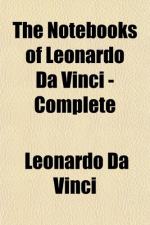And you, O Man, who will discern in this work of mine the wonderful works of Nature, if you think it would be a criminal thing to destroy it, reflect how much more criminal it is to take the life of a man; and if this, his external form, appears to thee marvellously constructed, remember that it is nothing as compared with the soul that dwells in that structure; for that indeed, be it what it may, is a thing divine. Leave it then to dwell in His work at His good will and pleasure, and let not your rage or malice destroy a life—for indeed, he who does not value it, does not himself deserve it [Footnote 19: In MS. II 15a is the note: chi no stima la vita, non la merita.].
[Footnote: This text is on the back of the drawings reproduced on Pl. CVII. Compare No. 798, 35 note on p. 111: Compare also No. 837 and 838.]
1141.
The soul can never be corrupted with the corruption of the body,, but is in the body as it were the air which causes the sound of the organ, where when a pipe bursts, the wind would cease to have any good effect. [Footnote: Compare No. 845.]
1142.
The part always has a tendency to reunite with its whole in order to escape from its imperfection.
The spirit desires to remain with its body, because, without the organic instruments of that body, it can neither act, nor feel anything.
1143.
If any one wishes to see how the soul dwells in its body, let him observe how this body uses its daily habitation; that is to say, if this is devoid of order and confused, the body will be kept in disorder and confusion by its soul.
1144.
Why does the eye see a thing more clearly in dreams than with the imagination being awake?
1145.
The senses are of the earth; Reason, stands apart in contemplation.
[Footnote: Compare No. 842.]
1146.
Every action needs to be prompted by a motive.
To know and to will are two operations of the human mind.
Discerning, judging, deliberating are acts of the human mind.
1147.
All our knowledge has its origin in our preceptions.
Science, its principles and rules (1148—1161)
1148.
Science is the observation of things possible, whether present or past; prescience is the knowledge of things which may come to pass, though but slowly.
1149.
Experience, the interpreter between formative nature and the human race, teaches how that nature acts among mortals; and being constrained by necessity cannot act otherwise than as reason, which is its helm, requires her to act.
1150.
Wisdom is the daughter of experience.
1151.
Nature is full of infinite causes that have never occured in experience.
1152.
Truth was the only daughter of Time.
1153.
Experience never errs; it is only your judgments that err by promising themselves effects such as are not caused by your experiments.




